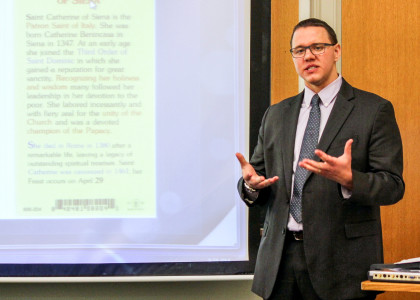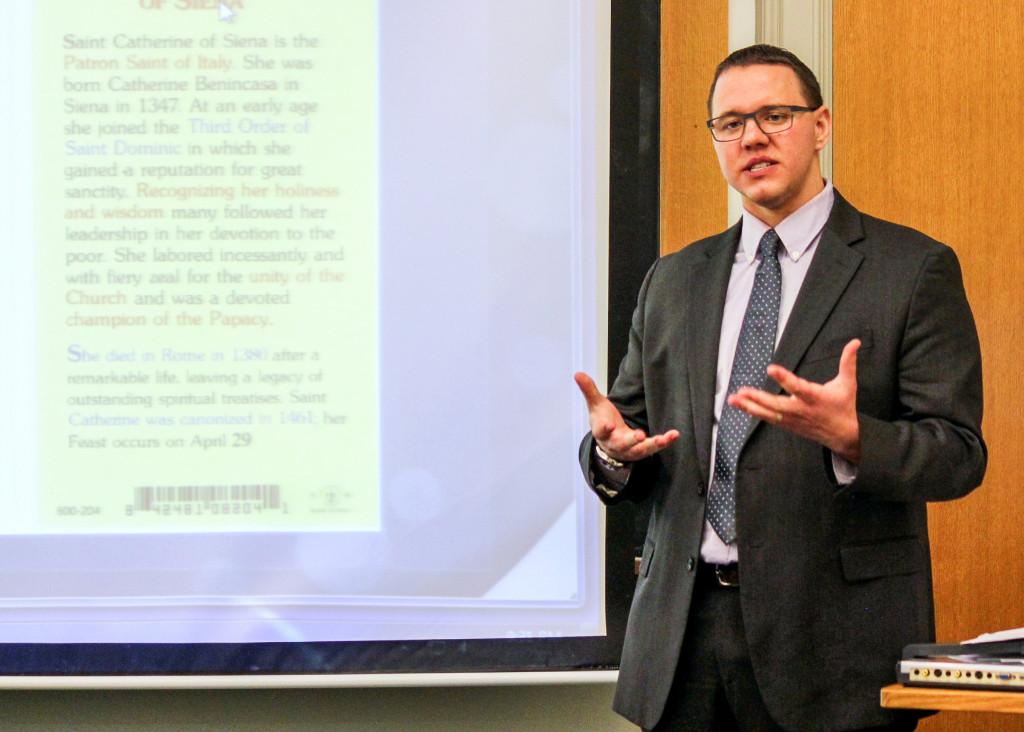Over the past week, Grinnell hosted four prominent alumni scholars who are actively conducting research in their respective fields of study. Among the alumni who presented at the College were Brian Clites ’05, a religious studies doctoral student from Northwestern University, and Kara Moskowitz ’06, an assistant professor of African History and the History of Development at the University of Toronto Scarborough.
On Tuesday, March 3, Clites gave a talk from his current project to a group of students and professors in ARH 120. His project, “The Politics of the Catholic Sexual Abuse Crisis: Trauma, Despair and Reform Amongst the People of God,” explores how Catholics have turned their trauma of sexual abuse into a cathartic social and juridical reform. His talk focused on the subject of “The Intimacy of the Streets: Performing Survivorhood at Clergy Sexual Abuse Protests.”
Professor Tyler Roberts, Religious Studies, said that he was particularly excited about Clites’ talk because Clites was his advisee during his time at Grinnell.

Photo by Misha Gelnarova.
“I’ve been involved with a number of these talks over the years and it’s always a joy to bring folks back,” Roberts said. “[Clites] was not only a major in Religious Studies, but was a student in the first Tutorial I ever taught at Grinnell, which means that I’ve known Brian since his first years in college.”
Throughout the course of his talk, Clites surveyed the anthropological, historical and ethnographic methods he used to conduct his research. Clites argued that survivors yearn for revered intimacy with their bishops and priests and that the new wave protest movement is not just about the money. Specifically, he mentioned that neither agency nor rebellion capture precisely what’s going on in the movement.
On Tuesday afternoon in ARH 102, Kara Moskowitz ’06, who graduated from Grinnell with a degree in history and earned both her M.A. and Ph.D from Emory University, presented her research on political order in postcolonial Kenya.
In her talk, Moskowitz focused on how squatter resistance affected the implementation of the World Bank. Through her analysis of squatter communities and community elites, such as the President of Kenya, Moskowitz concluded that through much discussion and much contention, both parties resulted in a patronage-based relationship. Such relationships, Moskowitz pointed out, helped establish postcolonial political order.
Attendee Glorianne Dorce ’17 found Moskowitz’s perspective to be too optimistic and lacked depth on other angles of the issue.
“The theory only painted the picture of positive movement towards development,” Dorce said. “I felt she did not delve deep enough [into] the self-interest of the politicians themselves. I had an overall understanding of the development itself in the historical context and the fact that internal factors and external factors affect the country.”
Other alumni who visited the College included Michael Gideon ’07 and Erika Zimmerman-Damer ’02, a postdoctoral fellow in the Center on Aging at the University of Chicago and an assistant professor in classical studies at the University of Richmond, respectively.



















































